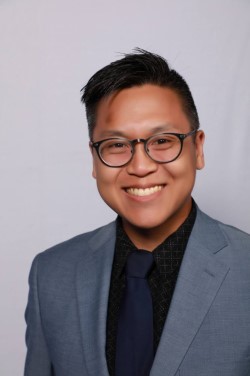
William Lai, DO
Endocrinology Fellow
Cooper University Hospital, Camden, NJ
Which internal residency program did you graduate from, and which fellowship program are you currently in?
I graduated from internal medicine residency in 2023 from Geisinger Health System in Northeast Pennsylvania. Currently, I am a fellow in endocrinology at Cooper University Hospital in Camden, NJ.
Why did you choose internal medicine and endocrinology?
I was drawn to internal medicine as it is one of the few specialties that combines the detective work of treating various medical conditions with the pleasure of working with patients. Each patient brings their own stories and perspectives, which—in combination with the pathophysiology of their various disorders—provide a complex interplay of practicing the science and art of medicine. Internal medicine allows me to explore the interconnected nature of various organ systems with dysfunctions in one area having profound effects on another. The specialty lets me think critically, apply physiology in real time, and collaborate across specialties to provide comprehensive care. The ability to work through both acute and chronic conditions ensures that every day is different, reinforcing my passion for lifelong learning and problem-solving.
Endocrinology is the ultimate extension of this analytical approach. Hormones regulate nearly every aspect of human physiology, and even small imbalances can have widespread effects. Understanding the mechanisms of the different endocrine or metabolic dysfunctions that can disrupt an entire network is like solving a physiological puzzle. Whether it is working someone up for mild autonomous Cushing’s syndrome or managing complex diabetes cases, endocrinology allows me to use critical thinking, a deep understanding of physiology, and interpersonal skills to work with patients on their medical journeys.
What lessons did you learn in residency and fellowship that will help you for the rest of your career?
Residency and fellowship instilled the belief that medicine is as much an art as it is a science. In endocrinology, we are blessed with having great laboratory resources that can help with the diagnostic burden of our specialty. However, the treatment aspect is more difficult. Residency and fellowship opened my eyes to the complexity of caring for our patients. The greatest successes I have seen in my practice have been those in which I have built long-term relationships with my patients. Many endocrine disorders require lifelong management, and I find great meaning in partnering with patients to optimize their health and quality of life. But to help your patients, you have to be their advocates for what will best help them as each individual will be different in what they need. Whether it's starting insulin regimens or discussing thyroidectomies, the impacts we have on patients are life altering and residency only strengthened the importance of patient-centered care as each patient wants and needs something different.
What are your plans for after fellowship? What factors or advice from mentors contributed to your decision?
“Do what you love” was the best advice my mentor gave me in residency and, for me, that means working closely with patients to help them achieve their health goals. Endocrinology provides a unique opportunity to leverage my medical knowledge to help make a lasting impact on metabolic conditions that influence nearly every aspect of a patient's well-being. Managing diabetes, thyroid disorders, or adrenal insufficiency isn’t just about numbers—it’s about improving quality of life, preventing complications, and empowering patients to take control of their health. The longitudinal nature of endocrinology allows me to build meaningful relationships, tailoring treatments to each patient’s needs and goals. The ability to restore balance and optimize health over time is incredibly fulfilling. I can’t think of a more humbling or rewarding way to spend my career than working alongside my patients, helping them navigate their conditions and improve their lives in meaningful, lasting ways.
How has being a member of ACP helped you in your professional life? What resources have been most helpful to you?
Between great board-preparatory materials such as MKSAP and other publications like I.M. Matters, ACP has been a powerful resource for learning in residency and fellowship. These resources provide clinical and board-relevant study materials with quick, palatable highlights that affect my daily practice of medicine. It has been crucial to the formation of my practice during residency and fellowship, and I have no doubt that moving forward as an attending it will be another source of lifelong learning to better serve my patients.

